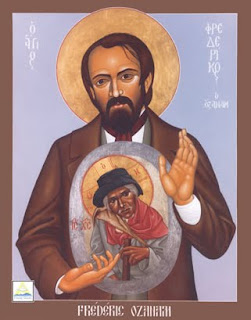Frederic Ozanam live a short life in one of the most tumultuous periods of history. Born in the year of Napoleon’s defeat at the Battle of Leipzip, Ozanam would witness two major political upheavals in France during his lifetime–The overthrow of the Bourbon Dynasty in the 1830 July Revolution and the end of Louis Philipp’s “Bourgeois Monarchy” during the 1848 Revolutions. Committed to the principles of democracy, Ozanam favored a Republic that supported the poor, not just the rich. At the time of his death, however, France was once again an empire and once again ruled by a Napoleon. Louise Napoleon had been crowned Napoleon III in 1852. In its quest for a lost greatness in the first half of the nineteenth century, France had not begun to address the many social problems which threatened her people. Tremendous economic and social changes brought ton by the transition from a predominantly rural and agricultural society to an urban and industrialized one threatened to disrupt French life, and were too often ineffectively addressed by governmental authorities. Some groups of intellectuals, such as the followers of the Utopian Socialist, Saint-Simon, began to suggest ways to improve the condition of the poor by forming ideal societies of laborers. Such groups, however, were frequently severe critics not only of the government but also of the Catholic Church and of things religious. When only eighteen years of age, Ozanam attacked the teachings of Saint-Simon, because they gave the poor a false hood for, and an equally false path to a “better life.” But that life was not based on Christian principles of mercy and love, was not infused with Christian faith, and was not improved by works of true charity. Two years later in 1833, challenged by Saint-Simonians at the University of Paris to practice what he preached, Ozanam and some other like-minded students formed the Conference of Charity and held the charter meeting in May of that year. Starting with less than eight members, the conference membership soared to more than one hundred in 1834. It was Ozanam who believed that the original conferences must divide into more units in order to service better the needy. By 1835, the society had its own official rule and a new official name: The Society of Saint Vincent DePaul. Throughout his life, Ozanam’s simple hope was to “become better–to do a little good.” After the deaths of his father r (1837) and his mother (1839), therefore, Frederic considered seriously a vocation as a priest. In 1840, he abandoned a legal career and became a professor of literature at the Sorbonne. Though he immediately linked his life of studies to his life of charity, he did not do so as a priest. Introduced to Marie-Jos≠phine-Am≠lie Soulacroix by one of his mentors P≠re Noirot, Ozanam married her in 1841. Together husband and wife devoted themselves to the task of reconciling married life to a life of good works. By 1852 the Society of Saint Vincent de Paul could boast 2000 conferences, 500 of which were not in France. Sickly since birth, Ozanam’s health deteriorated in the years after 1847. While visiting Italy for health and inspiration in 1852, Ozanam was stricken and his family decided to return him to his home in France. But he never reached his destination, dying en route in Marseilles on September 8, 1853 at the young age of forty. Frederic Ozanam was a model teacher, scholar, husband, and father. As a teacher and scholar, he was devoted to truth. From the time of his first challenge to live what he preached, Ozanam tried always to link the life of thought to a life of Christian action, and to help others do likewise. He wished to know his faith well and to live it fully. As a a husband, he was devoted to his wife, Am≠lie, whom he loved dearly for her support and trust. Together they lived a truly Christian married life of faith, hope, and love. As a father , he cherished his daughter Marie and, despite the demands on him, spent time nurturing and educating the daughter who was a joyous gift from God. In his work, in his family life, in his personal life, Ozanam was, and still remains, an exceptional model of a Christian life well-lived. Ozanam leaves a lasting legacy to all of us. His dedication to social reform and Christian social justice continues to moves us deeply. His integration of his professional and spiritual life continues to challenges us daily. His example of simple and open leadership continues to guide us effectively. His belief in the relevancy of the Christian message to modern life continues to inspire us constantly. His Society of Saint Vincent de Paul continues his active work of Christian charity, precisely because his legacy is lasting.












